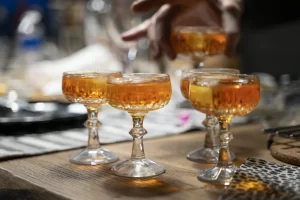Ohio Liquor Laws And Regulations
Ohio liquor laws and regulations are controlled and managed by the state. Ohio retains public ownership of the alcohol supply chain for distilled spirits across the state.
Distilleries in Ohio require different licenses and permits that allow them to manufacture, sell and ship alcoholic beverages with high alcohol content.
In this guide, we find out more about liquor laws in Ohio, required liquor licenses and license fees.
Ohio Liquor Laws
Similar to other states in the United States, Ohio has its own alcohol beverage control agency, the Department of Commerce Division of Liquor Control, that manages the production, distribution and retail sales of alcoholic drinks.
This agency also oversees the merchandising of mixed beverages, wine, beer and hard liquors.
Businesses that manufacture alcoholic beverages, such as distilleries, can apply for a liquor license or license transfer for liquor permit holders.
The Department of Commerce Division of Liquor Control also registers alcoholic product suppliers that do not manufacture their products in Ohio.
They also register any solicitors who promote alcoholic products in the state of Ohio.
Unlike some other US states that control the distribution and production of alcoholic beverages, Ohio doesn’t run government-controlled retail outlets to sell liquors.
Instead, it appoints private businesses that act as agents for the Department of Commerce Division of Liquor Control.
These agents can be grocery or convenience stores that sell liquor for the agency in exchange for a specific commission.
Diluted spirits with a 21% ABV can be sold by all grocery stores that obtain a permit.
Higher-proof spirits with an ABV of 21% and above are only sold in selected stores across the state.
In addition, the Department of Commerce Division of Liquor Control works together with Ohio Liquor (OHLQ) to ensure the fair distribution of liquor across the state.
Distributors and manufacturers of distilled spirits must also be licensed by the Alcohol and Tobacco Tax and Trade Bureau.
In addition to tax liabilities, this federal agency also provides approval of product labels because all distillers in Ohio need a certificate of label approval for their products.
Age Restrictions

Ohio’s liquor laws prevent any business from selling any type of alcoholic beverage to persons under the age of 21.
This applies to any kind of alcoholic drink, including beer, wine, hard liquor and celebratory drinks.
However, Ohio law allows people who are 18 years of age to sell wine, spirits and beer as long as they are in a sealed container.
Anyone serving alcoholic drinks must be at least 19 years old. Plus, you can only be employed as a bartender in Ohio if you are of legal drinking age which is 21 years or older.
Sale Time Restrictions
Businesses in Ohio are allowed to sell alcoholic beverages between 5:30am and 2:30am from Monday to Saturday.
If a business wants to sell alcohol on a Sunday, then it needs a permit. This comes with a restriction. Alcohol can only be sold between 10pm and 1am.
Required Licenses For Distilleries In Ohio
Ohio provides a number of different liquor licenses and permits for the production and distribution of alcoholic beverages.
Liquor licenses are based on the volume produced by a distillery each year.
Here is an overview of all available liquor permits in Ohio:
- Manufacture, import and sell alcohol and spirituous liquor
- Manufacturer of less than 100,000 gallons of spirituous liquor and sale to personal consumers
- Manufacture and sell certain prepared and bottled drinks
- Manufacturer of ice cream containing not less than one-half of one percent alcohol by volume and not more than six percent of alcohol by volume.
- Operate a warehouse for the storage of intoxicating liquor within the state and to sell such products from the warehouse to a B permit holder with Consent to Import on file or to other customers outside this state
License Fees For Ohio Distilleries
Here are the license fees for the individual liquor licenses and permits. Keep in mind that these fees can change depending on state laws and local regulations.
- Manufacture, important and sale of spirituous liquors: $2 to $3,906
- Production of less than 100,000 gallons of liquor with sale to personal consumers: $2 to $400
- Production and sale of certain bottled drinks: $3,906
- Manufacture of alcoholic ice cream: $1,000
- Operation of a warehouse for liquor storage: $1,563
Requirements For Distilleries In Ohio

The state of Ohio sets out a number of requirements to ensure that the product of distilled liquors and the distribution of alcoholic beverages is lawful.
Comply With All Requirements of Your License
When you apply for a liquor license, make sure that you read all the requirements and obligations that come with the license.
The Department of Commerce Division of Liquor Control also allows you to use a legal representative with your application.
It’s essential that you fully understand how you can keep your manufacturing processes and distribution compliant with state law as well as federal law.
Complete All Forms Required with Applications
In order to process your liquor license application without delay, the Department of Commerce Division of Liquor Control requires a number of forms and additional documents.
- Summary of Tenancy Rights Form: The business applicant must fill in this form if he doesn’t own his own premises.
- Partnership Disclosure Form: Complete this form if your business is a partnership entity.
- Limited Liability Disclosure Form: Fill in this form if your business is a Limited Liability Corporation.
- Officer or Shareholder Disclosure Form: Complete this form if your business is a corporation.
- Summary of Purchase Agreement: This form is only needed in some circumstances (check your main application form).
- Background Check: You may also have to complete a background check. Make sure to check your application for everything you need for the background check process.
You can hand these forms in hand signed or electronically signed.
Adhere To Tax Laws
The Department of Commerce Division of Liquor Control works together hand in hand with the federal Department of Taxation to identify permit holders who default on their tax payments.
Ohio State cannot grant a new liquor license to a business if there are gaps in tax returns or money is owed.
In addition, The Department of Commerce Division of Liquor Control also notifies the Department of Taxation when a permit is transferred to another owner.
The Taxation office must provide its approval before the transfer can be granted.
Final Thoughts
Ohio liquor laws and regulations are less stringent than in many other states across the United Stations.
However, distilleries should regularly check on updates to liquor licenses and fees.









